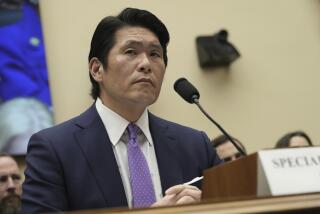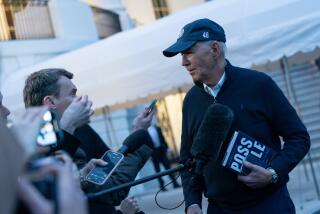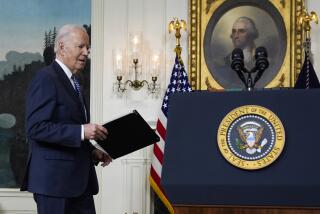Books & Ideas: Stephen Ambrose’s troubling Eisenhower record
I worried, almost from the beginning of my research into the presidency of Dwight Eisenhower, that something did not quite add up with Stephen Ambrose’s famous biography of the former president.
I say almost from the beginning because I had no inkling at the very first. I read “Supreme Commander: The War Years of Dwight D. Eisenhower” and “Eisenhower: The President,” Ambrose’s two-volume biography of Ike — and its one-volume condensation, “Eisenhower: Soldier and President” — with admiration and some intimidation. I relied on them for a few small details in my biography of Earl Warren, whom Eisenhower nominated to the Supreme Court in 1953.
But when I prepared to embark on an Eisenhower biography of my own — confined to his presidency — I went back through Ambrose’s work with meticulous care. I imagined myself building upon the presidential piece of Ambrose’s work, and I arrived at the Eisenhower Presidential Library in Abilene, Kan., with long lists of details to check. I was quickly cautioned. The exemplary librarians and archivists at the library — the guardians of Eisenhower’s legacy — warned me that checking Ambrose would not be easy. As they well knew and I quickly discovered, Ambrose’s shorthand made references difficult to confirm, and many telling passages lacked footnotes at all.
In other cases, strange errors undermined sourcing. Take, for instance, Ambrose’s riveting chapter on the 1956 presidential campaign, in which Ike defeated Adlai Stevenson while simultaneously juggling crises in Egypt and Hungary. Describing the administration’s reaction to a statement from the Soviet Union on Oct. 31, Ambrose quotes Allen Dulles, then director of Central Intelligence, as saying, “this utterance is one of the most significant to come out of the Soviet Union since the end of World War II.” Eisenhower replies, “Yes, if it is honest.”
The footnote in the one-volume edition of Ambrose’s biography cites page 170 of “Waging Peace,” one of Eisenhower’s memoirs. In fact, the exchange occurs at page 79. That’s not much of a mistake, but it is further compounded by confusion. A version of the same exchange appears in the minutes of a meeting of the National Security Council on Nov. 1, when Dulles described the events in Hungary as a “miracle” and the Soviet announcement as “one of the most important statements to come out of the USSR in the last decade.” Those minutes render the exchange somewhat differently than Ike and Ambrose do, and are less compelling because they do not feature Ike’s prescient retort. Ambrose opted for a second-hand account over an original source — then mucked up the reference in his notes.
Again, that’s hardly a felony. All works of great complexity contain small errors that are sometimes magnified by multiple tellings. Ideally, these are caught and fixed in later printings. What makes Ambrose’s work harder to assess is the cavalier nature of his sourcing generally. Many footnotes refer to documents at the Eisenhower Library by little more than name and date. There’s often no indication of what a particular document is, or even under whose name it might be filed. Ambrose offers little help in locating that material among the 26 million pages housed in Abilene.
These quibbles might just be quibbles were there not other reasons to wonder about Ambrose.
He had, as has been reported, the dismaying habit of plagiarizing others. This was revealed in 2002, when he was found to have lifted several passages from Thomas Childers for his account of B-24 bomber crews. The revelation touched off a flurry of inquiry that uncovered more than half a dozen additional examples of other people’s writing showing up in Ambrose’s work. As David Plotz of Slate wrote of the mini-scandal: “One plagiarism is careless. Two is a pattern. Four, five, or more is pathology.”
Now comes another set of challenges to Ambrose’s integrity. Recently, an earnest deputy director of the Eisenhower Presidential Library, Timothy Rives, set about checking Ambrose’s many alleged interviews with the president. These conversations are the source of dozens of footnotes in his books. Of nine interview dates that Rives discovered, seven do not match Eisenhower’s own meticulously kept schedule. Interviews with Milton Eisenhower, the president’s younger brother, do not check out either.
Rives has been careful not to suggest that Ambrose faked the information he supposedly gleaned from these many sessions, but it defies reason to imagine that Eisenhower somehow routinely omitted their meetings from his schedule. At a minimum, Rives’ research suggests that Ambrose significantly exaggerated his relationship with Ike.
All of this is puzzling because Ambrose was great. He was undeniably among America’s most engaging and successful historians. His work on Eisenhower is penetrating and readable, lively, balanced and insightful. Indeed, these efforts have long stood alongside Fred Greenstein’s “The Hidden-Hand Presidency” as the standards against which other Eisenhower scholarship is judged.
Why would such a scholar fudge on details, make careless errors and lift passages from others? There’s no way to answer that except, perhaps, to recall that George Harrison once admitted to subconscious plagiarism — and if it can happen to a Beatle, it can happen to anyone.
After the New Yorker published an article in late April detailing some of Rives’ findings, supporters of Ambrose, who died in 2002, rallied to defend him against what they saw as an unfair attack. Former California Gov. Pete Wilson, an admirer of both Ike and Ambrose, was elected to speak for Ambrose. Wilson’s responses, however, themselves seem illustrative of the problems that they seek to address.
Writing to the New Yorker, Wilson notes that, “though I was never privileged to meet President Eisenhower … I greatly admired him for his leadership as our Supreme Allied Commander in defeating Hitler and the enduring legacy of his Presidency.” Yet in a version of the same letter prepared for distribution to other news organizations, Wilson emphasizes: “I knew and admired President Eisenhower.” He knew Ike but wasn’t privileged to meet him? Huh?
Sloppiness begets sloppiness. If a Beatle could succumb to it, certainly a former governor could. And so, perhaps, could a distinguished historian.
Newton is The Times’ editor at large and the author of “Justice for All: Earl Warren and the Nation He Made.”
More to Read
The biggest entertainment stories
Get our big stories about Hollywood, film, television, music, arts, culture and more right in your inbox as soon as they publish.
You may occasionally receive promotional content from the Los Angeles Times.







